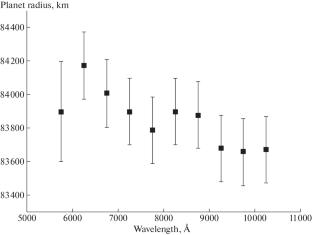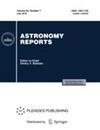根据多色测光凌日观测确定系外行星 HD 189733b 的大气层结构
IF 1.1
4区 物理与天体物理
Q3 ASTRONOMY & ASTROPHYSICS
引用次数: 0
摘要
在本文中,我们分析并解释了利用 HST 望远镜观测系外行星 HD 189733b 穿越恒星盘面所获得的光变曲线。观测是在 5500-10500 Å 的宽波长范围内进行的,这使得在解释行星半径的过程中确定波长与所获数据之间的关系成为可能。观测结果还表明,这种依赖关系可以用行星上存在的雷利大气层来解释,同时还对这种大气层的可能参数进行了近似估算。本文章由计算机程序翻译,如有差异,请以英文原文为准。

Determining the Structure of the Atmosphere Exoplanet HD 189733b Based on Multicolor Photometric Transit Observations
In this paper, we analyze and interpret light curves obtained by observing with the HST telescope the transit of exoplanet HD 189733b across the disk of the star. Observations are carried out in a wide wavelength range of 5500–10 500 Å, which makes it possible to identify the relation between the wavelength and the data obtained during the interpretation of the radius of the planet. It is also shown that this dependence can be explained by the presence of a Rayleigh atmosphere on the planet while the possible parameters of this atmosphere are also approximately estimated.
求助全文
通过发布文献求助,成功后即可免费获取论文全文。
去求助
来源期刊

Astronomy Reports
地学天文-天文与天体物理
CiteScore
1.40
自引率
20.00%
发文量
57
审稿时长
6-12 weeks
期刊介绍:
Astronomy Reports is an international peer reviewed journal that publishes original papers on astronomical topics, including theoretical and observational astrophysics, physics of the Sun, planetary astrophysics, radio astronomy, stellar astronomy, celestial mechanics, and astronomy methods and instrumentation.
 求助内容:
求助内容: 应助结果提醒方式:
应助结果提醒方式:


